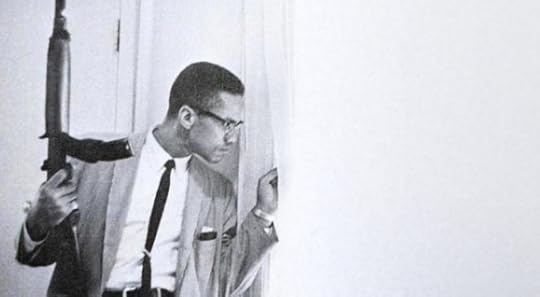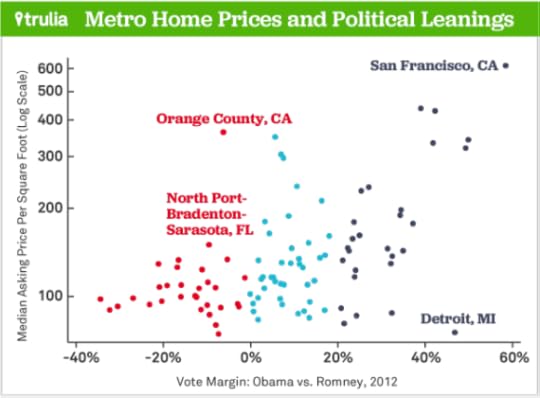Andrew Sullivan's Blog, page 108
October 29, 2014
The Best Of The Dish Today
Another note on the swift descent of ethical journalism. One concern I’ve repeatedly voiced is that at some point, corporations will simply dispense with “sponsored content” on existing publications and create newspapers and magazines for themselves. Since the Fourth Estate has already abandoned any pretense of being independent of advertizers for their content, it’s a small jump. And here comes Verizon with a new website:
The most-valuable, second-richest telecommunications company in the world is bankrolling a technology news site called SugarString.com. The publication, which is now hiring its first full-time editors and reporters, is meant to rival major tech websites like Wired and the Verge while bringing in a potentially giant mainstream audience to beat those competitors at their own game.
There’s just one catch: In exchange for the major corporate backing, tech reporters at SugarString are expressly forbidden from writing about American spying or net neutrality around the world, two of the biggest issues in tech and politics today.
It gets worse, doesn’t it?
Today, we revisited the plight of the Yazidis still facing the terror of ISIS; that “chickenshit” Netanyahu; and the broad definition of “sexual assault” that Ivy League higher-ups have signed onto, even if their students don’t quite agree. Plus: the campaign to shut down and even criminalize “toxic male culture”. I also re-engaged Ross Douthat on the issue of pastoral treatment of divorced and re-married Catholics.
Plus: a gorgeous video celebrating New York City and Paris.
The most popular post of the day was A Declaration Of War Against Francis; followed by Does The Self Exist? Many of today’s posts were updated with your emails – read them all here. You can always leave your unfiltered comments at our Facebook page and @sullydish. 24 more readers became subscribers today. You can join them here – and get access to all the readons and Deep Dish – for a little as $1.99 month. Gift subscriptions are available here. Dish t-shirts are for sale here, including the new “Know Dope” shirts, which are detailed here. Below are images for the general design and the DC-specific one (also available are ones for Oregon and Alaska – the two other states voting on legalization Tuesday):
The final email for the day comes from a veteran programmer. I’m going to give her the last word on the gamergate furore:
This is regarding your post about gamergate. I have been a very loyal reader of your blog for more than 10 years now and have been a subscriber for two. I have always dearly admired and respected you. I know this email is long and harshly worded in places, but please take the time to read it. It would mean a lot to me.
Your readers were right to warn you about not writing about that debate. At the very least, you should have researched the industry you were covering before making comments about it. Perhaps you did by reading some extremely lazy leftist writing on the subject (of which there is unfortunately much) or because you’ve been hanging out with Breitbart, who seems to be your ideological bedfellow in this – I don’t know.
[Ed. note: Professional details written here are being left out "because my identity will be easy to determine and it may put my life and that of my family in danger (this happened to other women for much less).] Whom I know is not especially important – the industry is so small that anyone who has been there for as long as I have knows all these same people. (Gamergate doesn’t quite see things that way and continues to weave conspiracy theories about it.) What I mean to convey is how personal all this is to me.
I don’t actually want to bring up the ludicrous “both sides have been bullied” quote, considering that only “one side” has received credible death threats that are being investigated by the FBI. [Ed. note: that "both sides" line was clarified in a follow-up post the reader may have missed.] I don’t mean to complain, because much like all of the mature nerdy adults I know, I’m over it, but I have to ask: do you honestly believe that only nerdy white males exist, that nerdy girls don’t get bullied? (I know I was!) I also had to then deal with not being taken seriously as a “fellow gamer” by the “gamer culture” whose end you’re lamenting for some reason (worry not, it will continue to thrive as is).
And you compare it to gay culture, as if there has ever been any actual or remotely comparable discrimination of gamers! Recall all the gamers who were murdered when they were caught holding hands in public while arranging for DS Download Play on their DSes!
Let’s take a moment of silence for the gamers who bought the latest Call of Duty: Modern Warfare only to be brutally beaten the next day for talking fondly about it in school! Let’s remember that time the arch-conservative Jack Thompson was preaching about the harm people who buy games do to society – wait wait, my bad … that was the game industry he was blaming for school shootings and the like. Andrew, forgive me, but you are off your rocker.
On the contrary, the multi-billion industry that is video games have catered to gamers to such a degree that it’s had some regrettable side effects. For instance, it is not uncommon for game creators to receive death threats for changing a game mechanic (in an effort to improve the experience for their audience)! It’s been happening for some time! Writers have been harassed to the point of quitting the games industry for including an optional homosexual romance in a popular game (Dragon Age 2). The anxiety and the terror I feel that the other shoe could drop at any minute, and that my life or that of my family could be in danger, is very real and has caused me a lot of anguish and stress.
The truth is, this is an audience that is so used to being treated with velvet gloves and getting their way, that manipulating the creators via threats is actually seen by some as a perfectly reasonable way to register a complaint. Short of the awful harassment that George Lucas must have suffered for “ruining childhoods” (not that I disagree he made some poor films), can you imagine any other creative medium with this kind of audience?
The developer who has been the real subject of gamergate for some time created a game about depression that was more an “interactive experience” (not unlike the old text adventure games of the early video games, ironically) and was not seen as a “real game” by those now in the gamergate movement. She was harassed well before her ex-boyfriend tried to ruin her life and career on the internet by airing their dirty laundry with that callous post. Why? Because there are people who don’t want developers to make games they don’t want to play and for them, simply ignoring these developers and their games won’t do. It’s as if Britney Spears fans went on a hateful rampage because they could not live in a world where Mary Timony was producing records, simply because Pitchfork chose to write about Mary’s releases every once in a while.
Let’s talk for a moment about Anita Sarkeesian. I support her work in spite of disagreeing with much of it, because I believe that if video games are ever to be a respected medium, acknowledged for meaningful cultural commentary (which I believe it very much deserves), it needs to have a rich tradition of critique and criticism – whether the critique is something everyone agrees with or not. However, no reasonable discussion can take place when Sarkeesian is being harassed and threatened with sexually violent murder. It so happens that the only video I ever found compelling of the many she has made is this one:
Analysis like yours strokes the hateful mob’s egos and reduces it entirely to what both the far left and Breitbart find intriguing: “a culture war”. Imagine how much progress could have been made about our environment or global warming if it hadn’t become part of the culture war. All this kind of politicizing does is force people to take sides that have no nuance, and I want no part in it. I happen to be a woman developer (already suspect for gamergate) who happens to make quirky games that people in that movement would hate but may refuse to ignore by harassing me (something I’m extremely worried about). Much as I have little respect for the left’s handling of this garbage, they actually stand up for my personal safety! They denounce these jerks when they see them, even if it’s with ridiculous academic language.
From everything I’ve seen, gamergate is an angry mob bent on bullying game creators into making something other than what they want to make. It is an angry mob bent on bullying journalists into voicing opinions other than those they have. They bully not by name-calling, rude words, or insults, but with threats of murder, rape, and school shootings. If your heart was in the right place, as it usually is, you should be condemning these asshole reactionaries. For the first time in my life, you’re talking about an issue that DIRECTLY affects me and my livelihood, and you’ve taken the bullies’ side, Andrew. It absolutely breaks my heart. Why, why, why can’t you call them on their shit?
For the record, this was the second paragraph of my post:
The tactics of harassment, threats of violence, foul misogyny, and stalking have absolutely no legitimate place in any discourse. Having read about what has happened to several women, who have merely dared to exercise their First Amendment rights, I can only say it’s been one of those rare stories that still has the capacity to shock me. I know it isn’t fair to tarnish an entire tendency with this kind of extremism, but the fact that this tactic seemed to be the first thing that some gamergate advocates deployed should send off some red flashing lights as to the culture it is defending.
See you in the morning.
(Photo: Competitors take part in the Tough Mudder London South in Winchester, England on October 25, 2014. The world-famous Tough Mudder is a military-style endurance event over 10-12 mile obstacle course designed to test all-around strength, stamina, teamwork, and mental grit. By Justin Setterfield/Getty Images)









The Complexion Of The Gun Rights Movement
Over the weekend, Charles C.W. Cooke urged Second Amendment activists to “consider talking a little less about Valley Forge and a little more about Jim Crow”:
Malcolm X may have a deservedly mixed reputation, but the famous photograph of him standing at the window, rifle in hand, insisting on black liberation “by any means necessary,” is about as American as it gets. It should be celebrated just like the “Don’t tread on me” Gadsden flag. By not making that connection, the movement is losing touch with one of its greatest triumphs and forsaking a prime illustration of why its cause is so just and so crucial.
Francis Wilkinson finds Cooke’s argument wanting:
If you’re looking for a model of public engagement, it’s hard to do worse than “by any means necessary.” The slogan obliterates compromise — it doesn’t repel violence so much as demand it. And in the late 1960s era of romantic leftist rebellion, Weatherman and others delivered memorably, irrevocably, bloodily, on the promise. …
Ultimately, Cooke’s vision of welcoming blacks into the gun movement ends right where other visions of maximum gun rights end: before the trouble begins. The chief problem with the gun-rights movement is not that it makes distinctions based on race — although it does. The biggest problem is that it doesn’t make distinctions based on more meaningful criteria: mental soundness, personal responsibility, adequate training.
Previous Dish on gun rights in black America here.









A Professional Peck On The Cheek, Ctd
A reader counters Bill Ridgers:
He could not be more wrong with the following statement: “Some rules of engagement are obvious: one would never peck on first introduction, for example, no matter where in the world you were.” I can only assume that Ridgers has never conducted any business in Latin America. Actually, you can go to certain parts of the business community in Miami and you’d get the same result – people meeting for the first time with a peck on the cheek. This is true for man/woman, woman/woman, and man/man. Men in Argentina, for example, routinely greet each other in a business context with a kiss. My wife is Latin, and she is confused when she meets “gringos” who act awkward when, upon meeting someone (man or woman) in a business or personal context, does not immediately gravitate to a kiss hello.
I’d add that, as a gringo myself, it took some getting used to this bit of culture. Now, I much prefer the kiss to a handshake, in part because I’m much less likely to get germs from a quick peck than a firm handshake. But I’d probably prefer fist bumps to kisses, if we could ever make that a standard greeting.









Face Of The Day
Members of some 30 families who live under a bridge rest amid candlelight after the illegal electric supply they were using was cut in Manila on October 29, 2014. Some earn money by selling flowers and collecting plastic bottles, earring an average of four US dollars a day. The Philippines announced in April plans to spend more on infrastructure and introduce other reforms to try to lift millions out of poverty. The revised Philippine Development Plan sets more ambitious economic targets to address persistent concerns that poor Filipinos are not enjoying the benefits of the country’s recent dramatic economic growth. By Noel Celis/AFP/Getty Images.









Ebola Federalism, Ctd
A reader pushes back on this post:
Just to be clear here, just because a health-care worker takes time off of work to go volunteer in West Africa in fighting Ebola doesn’t mean that the institution they work for is also volunteering their away time hours. In most cases, the worker must still have accrued enough time off to actually take the vacation in question – and the employer rarely distinguishes between hours off spent sipping martinis in the Maldives and hours off spent replacing IVs in Liberia.
And while the state might reimburse them for the lost wages, that doesn’t mean their medical employer has to welcome them back after three weeks of leaving their workplaces understaffed and their coworkers overworked to fill up the slack. Treating it like the health worker should just be happy they got 21 free days off work is a bit ignorant, and assumes that health care workers are all able to gallivant off from their workplaces. Most workplaces have penalties for taking excessive time off that go well beyond merely suspending pay during the unapproved absence, and those penalties usually include being fired.
But that’s not true here; Cuomo today reassured Ebola volunteers that their jobs will be secure – and then some:
Mr. Cuomo, speaking at an event in Staten Island, noted that the Army was instituting even more restrictive measures on their personnel working in Ebola-infested regions, denying them even contact with their families–and promised New York would duplicate the military’s policy of compensating overseas workers for their time. “If [Mr. Obama]‘s critical of the quarantine, then he has to be highly critical of the Army’s policy,” Mr. Cuomo told reporters today.
“I agree with the president, whose point is, ‘don’t discourage medical workers.’ And that’s why we’ll go the added step of actually putting together a package which I don’t think any other state has done, and which I don’t think the federal government has done.” Mr. Cuomo said he and his aides were meeting with hospitals and other medical organizations to hammer out a package that would guarantee doctors traveling to the nations of Guinea, Liberia, Sierra Leone and the Republic of the Ivory Coast–where Ebola has now killed thousands–a continued income, benefits and job security. “I don’t believe that there is a clash between getting doctors to go to West Africa and an effective quarantine. I don’t believe one is the enemy of the other.
The governor also noted how the NYC area is the most dense in the US, especially compared to a place like Nebraska, “so I don’t know if one-size-fits-all works” regarding the CDC’s nationwide standards. More on the press conference here:
Most of the doctors who go are hospital employees. They tend to be emergency room doctors that go,” the governor said. “I’m asking the hospitals, you tell me: what package I need to put together to encourage medical workers to go and to do it in cooperation with the medical community because the doctors and nurses want to make sure their job are protected when they get back.”
And the fact that Ebola volunteers tend to be ER docs in close contact with trauma patients makes Cuomo’s at-home quarantine even more sensible.









An Unofficial Home Away From Home
For her series Undocumented, Mary Beth Meehan photographed the homes of immigrants without visas:
Contrary to political rhetoric on the subject, Meehan photographs a group of people deeply embedded in their local communities; attending school, church, working, volunteering and paying taxes like every other citizen. The series captures a domestic landscape slightly askew, requiring the viewer to pick out the tell-tale clues of who these people are and the lives they are trying to build. While the soccer trophies, lazy boy sofas and Toy Story kids table feel decidedly American, there are hints of an immigrant household as well, blended together in a familial harmony evocative of our country’s self-proclaimed “melting pot” vision.
It’s upon further inspection that the work takes on a subtly somber tone. Meehan began photographing the interiors of these homes because their owners are afraid to show their faces. They cannot openly plead their case, nor can they risk exposure for fear they will lose everything they have worked so hard to build.
See more of Meehan’s work here.









Lincoln’s Media Strategy
Reviewing Harold Holzer’s Lincoln and the Power of the Press: The War for Public Opinion, Gary Wills marvels at how the president deftly handled newspaper editors and reporters, noting that journalism in his day “was a dirty game by later standards, and no one played it better than Abraham Lincoln”:
As soon as Lincoln was elected he set about new dealings with the press. His inaugural
address was secretly set in type by the editor of the Illinois State Journal, which had the sole firsthand report of his remarks at the train station as he left for Washington. Armed with the presidency, Lincoln famously tried to appoint cabinet members and military officers of as wide political variety as would cooperate with him. Holzer shows us something further—that he used patronage to recruit the loyalties of newspaper owners, editors, and reporters on a grand scale. Newspapering became the preferred path to becoming ambassador, port inspector, revenue collector, postmaster, and White House staffer—dozens and dozens of the ink-stained were brought in to save the Union.
Lincoln even kept wooing the stubbornly negrophobe editor James Gordon Bennett, of the New York Herald, making his son a navy lieutenant (how could the father not support a war his favored son was fighting in?). Lincoln helped a favored editor, John Wein Forney, move from the Philadelphia Press to set up the Sunday Morning Chronicle in Washington by securing for him the remunerative post of secretary of the Senate and giving the new paper government advertising accounts.
Myron Magnet riffs on a different display of Lincoln’s communication skills, his Second Inaugural. He notes the speech is given a close reading in Richard Brookhiser’s new book on Lincoln, Founders’ Son:
Brookhiser properly devotes an entire chapter to Lincoln’s Second Inaugural Address, which he rightly judges the greatest of his speeches—and (in my view) is perhaps the greatest speech ever made. In it, Brookhiser believes, Lincoln completed his lifelong search for a surrogate father, moving from the Founding Fathers to God the Father. To be sure, this speech, delivered on March 4, 1865, like the Gettysburg Address given some 15 months earlier, resounds with the poetry of the King James Bible, which a childhood friend of Lincoln’s sons’ remembered the president would often read after lunch in the White House, while the children played, “sometimes in his stocking feet with one long leg crossed over the other, the unshod foot slowly waving back and forth” as he kept time to the rhythm of the Elizabethan language’s stupendous music.
(Image: the first photograph taken of Lincoln after he was elected, 1861, via Wikimedia Commons)









Pot Polling Update
Jacob Sullum checks in on all the states with legalization on the ballot. Oregon could go either way:
A new Oregonian poll puts support for Measure 91, which would legalize commercial production and distribution as well as possession and use, at 44 percent, with 46 percent opposed, 7 percent undecided, and 2 percent declining to say. That two-point difference is within the poll’s margin of error, so the results suggest a dead heat. By comparison, a poll conducted earlier in October, commissioned by Oregon Public Broadcasting and the Fox station in Portland, put support at 52 percent, with 41 percent opposed and 7 percent undecided. The sample in the latter poll was somewhat younger, based on different projections of who will vote. Turnout by younger voters, who are consistently more likely to support legalization, could be crucial to the outcome.
But Jon Walker bets that legalization is still ahead:
[Oregonian pollster Stuart] Elway’s marijuana legalization poll of Washington State at this same time two years ago was off. It found Initiative 502 leading only 48 percent yes to 44 percent no, but it ended up winning 55.5 percent to 44.5 percent. By comparison, SuveryUSA’s final poll of Initiative 502 was very close to the final result.
(Image: A “Know Dope” Oregon shirt available here)









The Cost Of Living In A Liberal City
Jed Kolko connects cities’ housing costs to the politics of their residents:
Looking across all 100 largest metros, the correlation between price-per-square-foot and 2012 vote margin was positive, high (0.63), and statistically significant. In fact, the only expensive red market was Orange County, CA, at $363 per square foot. There was a huge drop-off to the next-most-expensive red market—North Port-Bradenton-Sarasota, FL, at $150 per square foot.
Derek Thompson isn’t surprised:
There is a deep literature trying liberal residents to illiberal housing policies that create affordability crunches for the middle class. In 2010, UCLA economist Matthew Kahn published a study of California cities, which found that liberal metros issued fewer new housing permits. The correlation held over time: As California cities became more liberal, he said, they built fewer homes.









Are Publishers Even Necessary?
In the ongoing feud between the major publishing houses and Amazon, Yglesias has no sympathy for the publishers:
Wisdom on this subject begins with the observation that the book publishing industry is not a cuddly craft affair. It’s dominated by a Big Four of publishers, who are themselves subsidiaries of much larger conglomerates. Simon & Schuster is owned by CBS, HarperCollins is owned by NewsCorp, Penguin and RandomHouse are jointly owned by Pearson and Bertelsmann, and Hachette is part of an enormous French company called Lagadère.
These are not tiny, helpless enterprises. Were their owners interested in the future of books and publishing, they could invest the money necessary to make their own e-reading apps and e-book store and render Amazon entirely superfluous. But the managers of these conglomerates don’t really care. If they can get famous authors to lobby the government to stop Amazon from killing them for free, then they’re happy to take the free labor. But they don’t want to invest actual money and energy in competing with Amazon, they’d rather wring whatever remaining profit there is out of book publishing and dedicate the money to dividends or other industries they’re also involved in.
Matt goes as far as to suggest that publishers’ role as middlemen between authors and consumers has become superfluous in the digital age. Hear hear. But Evan Hughes isn’t having it:
A publisher’s list of books is in essence a risk pool, a term most often associated with health insurance. In the insurance business, the profits from the healthy people outweigh the big losses from the sick ones because the healthy outnumber the sick. In publishing, it’s the opposite, yet the underlying concept is the same. Most books lose money, but the ones that make money earn enough to cover all those novels that didn’t sell.
The publishing scenario that Yglesias is advocating is a world without health insurance. (Ironic, I know.) In a system without the publisher operating as middleman, where the author takes his life’s work and just posts it to Amazon, each book becomes a lonely outpost in the stiff winds of the marketplace, a tiny business that must sell or die. “So what?” Yglesias might say, because that’s the kind of ruthless neoliberal thinker he is. “If people didn’t buy the book, that’s just proof of its worthlessness.”
Yep, especially when the Internet allows anyone with the right voice to find an audience, however niche, to buy their book. And none of the money from those sales will get eaten up by the bloated middlemen of the publishing industry. But Guan Yang runs through some downsides of self-publishing:
A lot of work goes into publishing a book. Someone needs to edit the manuscript. The manuscript must be typeset and copy-edited. A cover has to be designed (most self-published books are terrible in this regard). The book needs to be marketed to readers, which can require producing ads and seeking out publicity. Paper books have to be printed, stored, shipped to distributors and bookstores, and sold; returns need to be managed. E-books have to be converted to various formats, ideally not just using automated tools.
Self-published authors can try to do all of these jobs themselves. Many attempt that, and it shows. Or they can outsource some or all of the tasks. When doing so, it’s best to use professionals who have tried to publish a book before. Maybe a team that’s used to working together. Perhaps the people even sit in the same building, so that they can quickly coordinate.
Congratulations: You have just re-created publishers, but without advances.
And without all the waste and inefficiency of many large publishing houses. Freelance copyeditors or cover designers can be found online for much less, and they are likely to be more receptive and flexible when it comes to the author’s needs. McArdle puzzles over another question Yglesias raises -whether the interests of authors align with those of their publishers:
If Amazon manages to kill most of the other outlets for books, it’s not clear to me that authors end up with more royalties and book sales. The distribution of royalties will certainly be different; some people who would have done well under the current system will end up losing out, while others who couldn’t get a major publisher interested in their product will end up making bank. But as a class, author interests might well be better aligned with those of four mega publishers than one mega retailer. Or might not; I haven’t seen a convincing case made either way.
Even assuming that we establish that Amazonian dominance might be bad for authors, we still have to answer another question: Why should anyone else care? Travelocity was bad for travel agents. Toyota was bad for General Motors. To which most people respond, “Gee, that’s too bad for you, isn’t it?” and happily go about their days. Why should authors be any different?









Andrew Sullivan's Blog
- Andrew Sullivan's profile
- 153 followers









